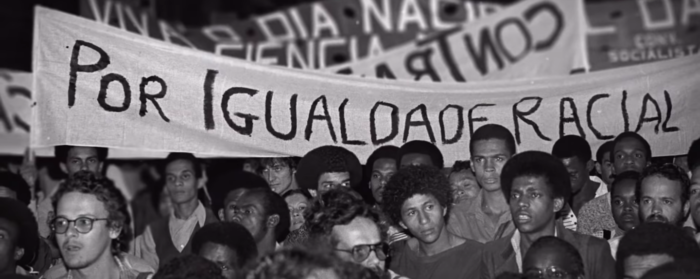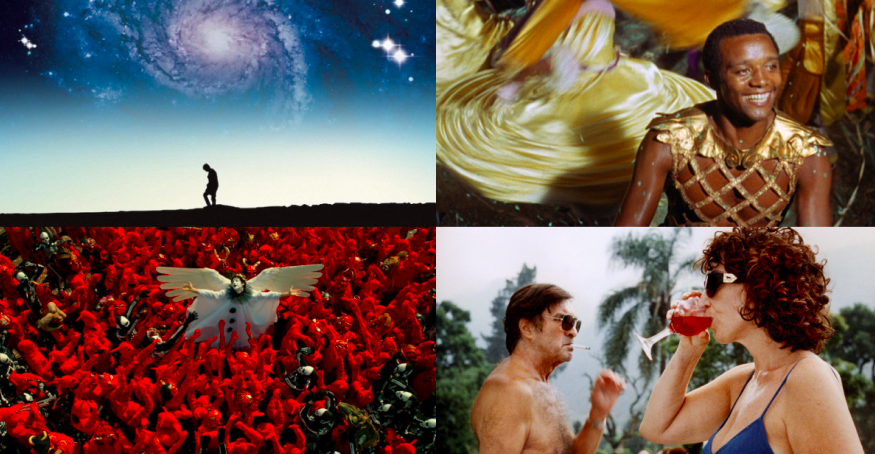The following independent Latin American film productions have been carefully selected by our writer Gianna Giordani to showcase the continent’s cinematic diversity, and, more broadly, the region’s artistic mastery. It is important to understand that each film included in this list bears a social or political message, therefore highlighting the value of film and cinema in both individual and collective transformation.
Emicida: AmarElo – It’s All for Yesterday (2020)

If you’re looking for a comprehensive overview of Brazil’s Black history – much of which has been forcibly erased from “official” accounts of the past – then look no further. In this 90-minute documentary which shines a light on the Black Brazilian experience, singer-songwriter, rapper and MC known as Emicida takes the viewer along with him on a spiritual, musical and intellectual journey. History is (re)told through samba, funk, rap and jazz; not merely as a way of celebrating the diversity of Brazilian music and its historical significance, but also in order to demonstrate that the past is inextricable from the present – and the future. This beautiful film is graced with interviews with some of Brazil’s most celebrated artists including Gilberto Gil, Pablo Vittar, Wilson das Neves, and Ruth de Souza, to name just a few.
Emicida: AmarElo – It’s All for Yesterday is available to watch on Netflix.
Nostalgia for the Light (2010)
In the sublime Atacama Desert, time itself becomes warped and subject to great scrutiny. In place where astronomy meets excavation, personal histories become intertwined with the cosmos and memory becomes a profound device which does not reside in the past. Documentary maker Patricio Guzmán works at the intersection between science and politics in this intensely thought-provoking documentary; he explores the significance – and very meaning – of the past for victims of violence under Pinochet’s authoritarian rule and for astronomers who are able to extract fundamental truths by observing the sky. Composed of a wide mix of interviews and knowledgeable perspectives, Nostalgia de la luz is an acute philosophical enquiry about the nature of temporality in our world, the vast expanse of the Atacama serving as the interrogation room.
Nostalgia for the Light is available to watch on Google Play.
The Chosen Ones (2015)
Having premiered at the 2015 Cannes Film Festival, Mexican drama Las Elegidas paints a tragic portrait of the grooming and kidnapping of underage girls and the nefariousness of Mexico’s sex trafficking industry. At the age of just 14, Sofia is forced into prostitution by her boyfriend, Ulises, who is under strict orders from his father and brother to ensure the seamless running of the family business. With painstaking and gruesome realism, David Pablo’s film focuses both on the larger endemic issue of child kidnapping and prostitution, whilst also honing in on the interior conditions and affective realities of both victims and perpetrators. Dialogue between the abducted and the abductor is a noteworthy feature in The Chosen Ones, as are the bleak brothel scenes which leave you feeling terribly uneasy and perhaps even angry.
Las Elegidas is available to watch on Netflix.
Endless Poetry (2016)
Nothing was off the cards during the realisation of this filmic memoir from Chilean-French filmmaker, poet and playwright (among many other titles), Alejandro Jodorowsky. A sequel to The Dance of Reality, Endless Poetry tells the story of Jodorowsky’s life upon leaving his childhood home in Tocopilla and moving to Chile’s capital, Santiago. In a truly incongruous sequence of events which make us feel as if moving through a dream, we learn about the adolescent Jodoroswky’s burning desire to become a poet, much against the will of his authoritarian father. Realising that poetry is the only thing that makes sense to him intellectually, spiritually and psychologically, Alejandro obsesses about how to unleash his creative demons. In doing so, he inspires and is inspired by some of Chile’s greatest poets Pablo Neruda, Nicanor Parra, Stella Díaz Varín and Enrique Lihn.
Endless Poetry is available to watch on Amazon Prime.
Black Orpheus (1959)
Throwing it back to the 1950s is Marcel Camus’ interpretation of the Greek myth of Orpheus and Eurydice, with Vinicius de Moraes’ 1956 play Orfeu da Conceição as its backbone. The ancient tale of a young man who travels to the underworld to rescue the woman he loves, eventually succumbing to temptation, finds a favela in Rio de Janeiro as its setting this time round, and its all-black cast are the movers of the myth. The Italian-French-Brazilian production is perhaps a little too exoticised for the contemporary eye, with some rather over-caricaturised scenes and characters; but setting a beautiful tale of tragedy and despair in a Rio de Janeiro favela is no less revolutionary because of it. After all, it’s not often we see Afro-Brazilian culture collide with Greek mythology. Carnival in Rio is a time of excess, theatre and dress-up. This level of grandiosity, set against the humility of life on Rio’s hilltops, really captures much of the city’s essence and identity, with the music of Antonio Carlos Jobim and Luis Bonfá pushing us even further into the ultimate carnival experience.
Black Orpheus is available to watch on YouTube.
I’m No Longer Here (2019)
From a well-respected gang leader in Monterrey, Mexico to an immigrant in Queens, New York, seventeen-year-old Ulises is forced to go from one world in which he is revered, to another where his clout is as significant as a speck of dust blowing in the wind. With the film moving between Monterrey and Queens, Fernando Frías de la Parra puts into question the very meaning of cultural identity, demonstrating both its malleability and simultaneous rigidity. With Los Terkos, Ulises’ gang, living by the ‘Cholombiano’ subculture, music and dance – cumbia specifically – becomes Ulises’ preferred medium of expression. It follows him like a shadow; its non-linguistic properties allowing for a fluidity of the soul which does not obey geographical constraints. I’m No Longer Here’s cultural significance is perhaps one of the reasons it’s Mexico’s Oscar nomination for Best International Feature Film in 2021 and the recipient of ten Ariel Awards.
I’m No Longer Here is available to watch on Netflix.
The Magic Gloves (2003)
Streaming as part of Mubi’s collection ‘Melancholy and Deadpan: The Films of Martín Rejtman,’ this award-winning production is as dry and absurd as Latin American cinema gets. Against the backdrop of the Argentine metropolis – which always feels extremely vague and blurry – the characters’ disorderly and nonsensical behaviours and interactions feel even more disorienting and frivolous. With the somewhat uneventful plot following the lives of a handful of adults fruitlessly trying to navigate their way through their thirties, we too are plunged into their existential crises in which the banalities of life feel like a merry-go-round we can never get off, despite how nauseous it makes us feel. To add to this queasiness, much of the story takes place in a moving vehicle.
The Magic Gloves is available to watch on MUBI.
La Ciénaga (2001)

Uneventful yet wildly chaotic, Lucrecia Martel’s feature film debut effortlessly encapsulates the ideology and sentiment of New Argentine Cinema. Many auteurs working within this new wave favoured a quasi-naturalist, documentary-like style of filmmaking over the theatrical, traditionalist cinema which preceded it. Packed with linguistic subtleties and nuanced imagery, La Ciénaga, tells the story of a family’s reunion in the sweltering, thick-aired Argentine heat; a visceral image which many deem symbolic of the rotting, stagnating bourgeoisie. Martel’s shots are always hectic and packed with people; on-screen bodies are stuck together by sweat and other bodily fluids, and the outdoors feels even more restricting than interiors. The cynical dialogues and haphazard interactions in La Ciénaga can, in many ways, be compared to Rejtman’s The Magic Gloves. Both works of New Argentine Cinema, they offer up a new perspective on the purpose of film in Argentinian society.
La Ciénaga is available to watch on Amazon Prime.
Bacurau (2019)
Brazil’s sertão (the nation’s northeastern “hinterlands”) has, for a long time, been considered a space of social and geographical isolation; a space where tradition prevails over modernity. It’s been the subject of many great films – notably Nelson Pereira dos Santos’ Vidas Secas (Barren Lives) – many of which belong to the Cinema Novo genre. When it rose to prominence in the 1960s, Cinema Novo set out to show the true face of Brazil, exposing the race and class disparities which were, and remain, rife in Brazil. Bacurau bears many of these Cinema Novo thematic traits, at the same time drawing on elements of sci-fi, western, horror and satire. To categorise it in one sole genre would be a gross misinterpretation. Perhaps the film’s greatest poignancy is its nuanced and at times indecipherable references to globalisation and colonialism; two forces which the residents of Bacurau (a tiny village which mysteriously disappears off the face of the earth) fight off with surreal might and courage. It’s also a great film to consider in light of the rise of the far-right in Brazil.
Bacurau is available to watch on MUBI.
Amores Perros (2000)
This film is not for the faint-hearted. Enthrallingly vivid, raw and at times extremely bloody, Amores Perros is a violent collision of three seemingly diverging destinies: a teenage mother seduced by her brother-in-law, a supermodel who moves in with her married boyfriend, and a homeless hitman. It seems odd that the common denominator of these three tales would be dogs. And yet, Alejandro González Iñárritu’s directorial debut somehow manages to create a film in which the lives of individuals who are worlds apart are somehow determined by canine occurrences. Perhaps a reference to the animal that lies within every human being, the brutality of the film does not discriminate between human fights and dog fights; both are savage, both are extreme, both are fatal.
Amores Perros is available to watch on Amazon Prime.

